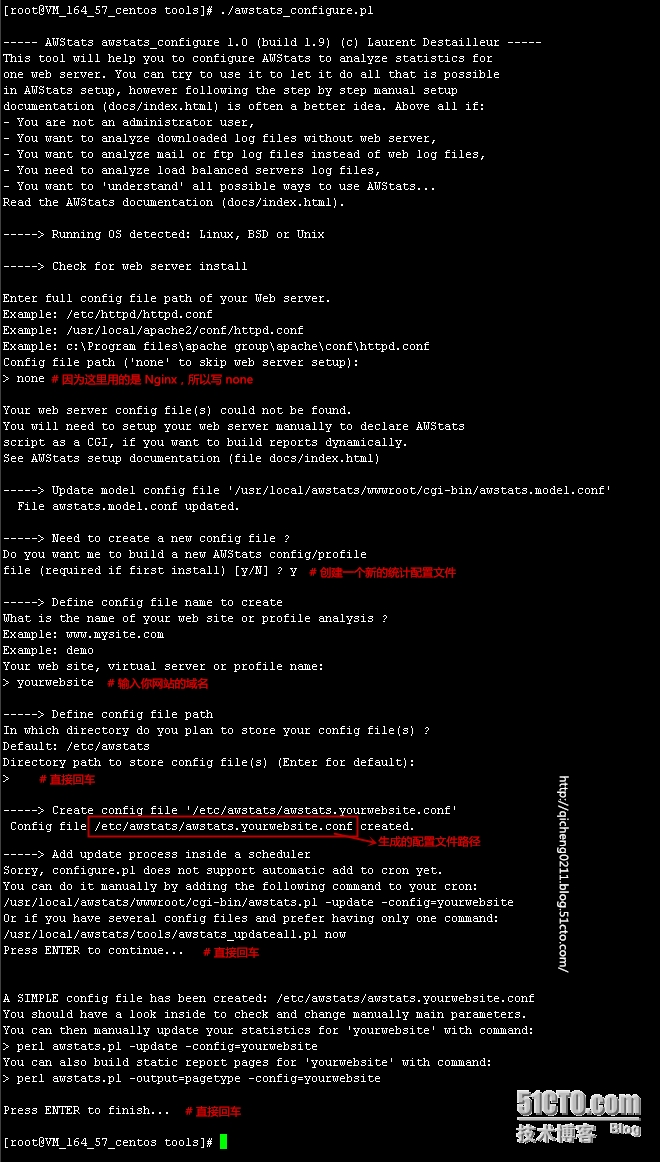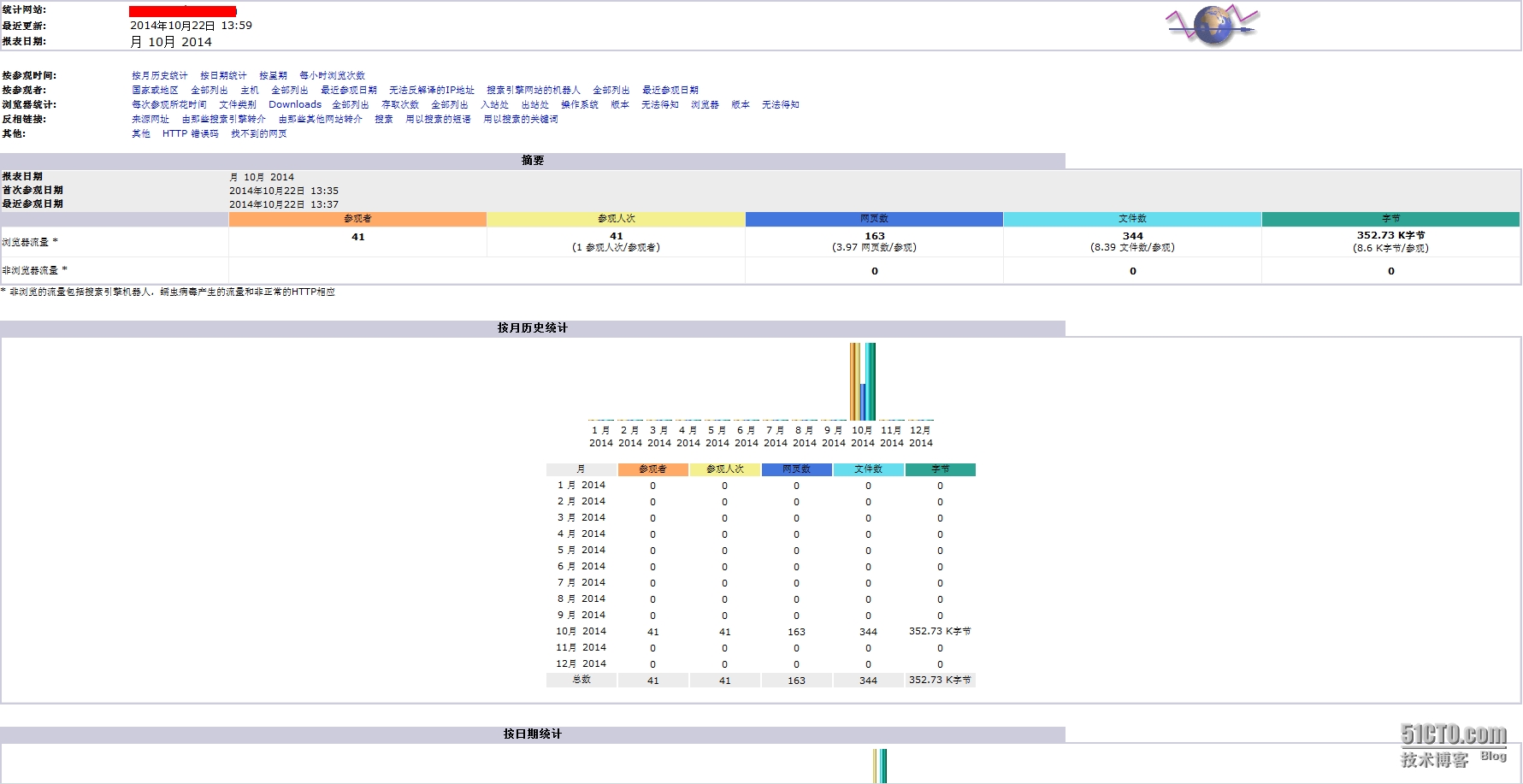AWStats分析Nginx访问日志
AWStats是在Sourceforge上发展很快的一个基于Perl的WEB日志分析工具。
它可以统计您站点的如下信息:
访问量(UV),访问次数,页面浏览量(PV),点击数,数据流量等
精确到每月、每日、每小时的数据
访问者国家
访问者IP
Robots/Spiders的统计
访客持续时间
对不同Files type的统计信息
Pages-URL的统计
访客操作系统浏览器等信息
其它信息(搜索关键字等等)
下面是AWStats分析Nginx日志的操作步骤:
一、配置nginx日志格式
修改nginx.conf的日志格式,不然awstats无法分析。
log_format access '$remote_addr - $remote_user [$time_local] "$request" ' '$status $body_bytes_sent "$http_referer" ' '"$http_user_agent" "$http_x_forwarded_for"'; access_log /var/log/nginx/access.log access;
注意,日志格式里的双引号不能漏了且每个参数之间是一个空格分隔,因为只要有细微的差别,awstats就无法读取日志。
改好后,使nginx重读配置文件:
shell# nginx -t && nginx -s reload
二、自动切割nginx日志
每天晚上23点59分定时执行一个shell脚本来切割nginx日志。脚本内容如下:
#!/bin/bash # # Filename: nginxCutLog.sh # Author: Qicheng # Website: http://qicheng0211.blog.51cto.com/ # Description: 切割nginx日志 # Notes: 设置crontab,每天23点59分定时执行 # ROOT_UID=0 if [ "$UID" -ne "$ROOT_UID" ];then echo "Error: 必须以root用户运行此程序!" exit 1 fi nginx_logs_dir="/var/log/nginx" nginx_pid_file="/var/run/nginx.pid" # 切割后的日志文件名,例如access_20141022.log nginx_log_today="$nginx_logs_dir/access_`date +%Y%m%d`.log" while [ `date +%S` -ne 59 ];do sleep 1 done sleep 1 [ -f "$nginx_log_today" ] && exit 1 mv $nginx_logs_dir/access.log $nginx_log_today # 给nginx发送USR1信号,使重新打开新的access.log日志文件 [ -f $nginx_pid_file ] && /bin/kill -USR1 $(cat $nginx_pid_file)
设置crontab:
59 23 * * * /bin/bash /yourscriptpath/nginxCutLog.sh
三、安装awstats
shell# wget http://awstats.sourceforge.net/files/awstats-7.0.tar.gz shell# tar -zxvf awstats-7.0.tar.gz shell# mv awstats-7.0 /usr/local/awstats shell# mkdir -p /var/lib/awstats
四、配置awstats
进入/usr/local/awstats/tools/目录,执行配置脚本awstats_configure.pl:
shell# cd /usr/local/awstats/tools/ shell# ./awstats_configure.pl

程序执行结束后,会在/etc/awstats/目录下生成你的配置文件。然后编辑配置文件,修改LogFile参数,跟日志切割脚本中的日志路径对应起来:
LogFile="/var/log/nginx/access_%YYYY-24%MM-24%DD-24.log"
注意,这里日期格式“%YYYY-24%MM-24%DD-24”,是指24小时之前的年月日,也就是昨天的日期。
测试:
shell# /usr/local/awstats/wwwroot/cgi-bin/awstats.pl -update -config=yourwebsite
注意:-config=后面的参数是你在执行awstats_configure.pl时输入的站点域名。

五、配置awstats生成静态页面
利用awstats的工具将统计的结果生成静态文件:
shell# mkdir -p /var/www/awstats shell# /usr/local/awstats/tools/awstats_buildstaticpages.pl -update -config=yourwebsite -lang=cn -dir=/var/www/awstats -awstatsprog=/usr/local/awstats/wwwroot/cgi-bin/awstats.pl
注意:-config=后面的参数是你在执行awstats_configure.pl时输入的站点域名;-dir=是统计结果静态文件的输出目录。
设置crontab,每天凌晨00:01定时更新静态页面:
1 0 * * * /usr/local/awstats/tools/awstats_buildstaticpages.pl -update -config=yourwebsite -lang=cn -dir=/var/www/awstats -awstatsprog=/usr/local/awstats/wwwroot/cgi-bin/awstats.pl
一般站长都不愿随便让人知道自己站的真实流量,所以要把awstats统计结果页面进行密码保护,这里需要用到apache自带的工具htpasswd:
shell# yum -y install httpd-tools shell# htpasswd -cd admin.pass admin New password: Re-type new password: Adding password for user admin
把生成的密码文件admin.pass放到nginx主配置目录下(/etc/nginx/)。
在nginx配置扩展目录(/etc/nginx/conf.d/)下新建awstats.conf配置文件,内容如下:
server {
listen 83;
server_name localhost;
location ~ ^/awstats/ { # html 静态页面目录
root /var/www;
index index.html;
access_log off;
error_log off;
charset gb2312;
auth_basic "admin";
auth_basic_user_file admin.pass;
}
location ~ ^/icon/ { # 图标目录
root /usr/local/awstats/wwwroot;
index index.html;
access_log off;
error_log off;
}
location / {
return 403;
}
}
最后使nginx重读配置文件,用浏览器查看统计结果 http://yourhostname:83/awstats/awstats.yourwebsite.html
日志分析页面示例:

参考资料:
http://baike.baidu.com/view/228748.htm?fr=aladdin
http://www.ibm.com/developerworks/cn/linux/l-cn-awstats-nginx/(有些错误,已在本文中纠正)